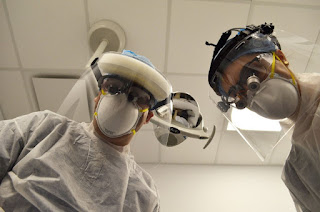The health of New Brunswickers begins in the mouth. It’s true; we are what we eat and when nutrition is compromised, evidence of distress in heart, lungs, muscles, blood and bones presents in the mouth and spiders throughout the rest of the body with an array of symptoms. Diabetes and heart disease are impacted by dental disease as are conditions like arthritis and fibromyalgia. The list is long. Sadly, though, dental care is not covered as part of the Medicare scheme in this province. Imagine the cost savings across the board if it was!
Fluoridation of water supplies have improved quality of health of teeth and mouth, but it was never meant to be a replacement for proper dental care which is a multi-layered process. In covering routine dental care and follow-up with cleanings and fillings, the province will save money on the other side of care – physical medicine and the costs related to treating illnesses linked to cardio-pulmonary function. Repeat infections are often rooted in the mouth but manifest in the throat and lungs. Are doctors asking the right questions of patients they see a few times a year? I think not.
The Dental Program under Health and Community Services covers exams, X-rays, extractions and fillings to a maximum of $1,000/year, as well as dentures and denture repairs; those with disability may be entitled to dental cleanings. But what about the rest who are barely making it financially and struggle to keep a roof over their head and food on the table?
Medicare should cover all levels of dental care. There are far too many in this province who live in constant pain due to dental disease which often results in tooth loss. Then there’s the social stigma of tooth loss and the anxiety it causes.
All of this could conceivably go away with the province once and for all covering dental care, beginning with early childhood interventions that include parent/caregiver. A start would be a daily morning tooth brushing regimen for children from daycare through 6th grade with the government providing funds to support supplies.
It was wrongly believed that our oral health was up to us; our individual responsibility. In society there will always be those who are not able, for whatever reason, to make sound decisions about life choices, health care among them, so public financing of this important component of our daily lives cannot be viewed as a ‘give-away’ to the poor and those of limited means. Their issues go deeper.
Living hand to mouth, paycheck to paycheck is emotionally exhausting as people try to portion out their wages or their welfare benefits to cover all or most of their needs. Last on their list, unfortunately, is dental care. The cost of a routine exam is prohibitive for many who’ve lived on the financial fringes all of their lives, from the cradle, for far too many. Certainly, there are mechanisms in place through the province for those who are recipients of their financial systems of support. The naysayers of even that level of assistance point fingers, going on ad nauseam about people not being interested in working and laying about at home doing nothing. That’s an unfair and erroneous assessment and it’s insulting to those, often single mothers with 2 or more children, who are simultaneously juggling several different balls just to keep it all going.
The respiratory system can suffer as a result of poor oral health. Bacteria in the mouth from infected teeth and swollen gums can be breathed into the lungs or travel there through the bloodstream. Once there the bacteria can lead to respiratory infections, pneumonia, acute bronchitis, and even COPD. How many hospital admissions for heart and lung issues have their beginnings in a bad tooth and concurrent infection? I would suspect there are many. In supporting dental care, funds could be redirected to programs where children spend most of their time – in school.
It reasons that children’s dental health should be set as a priority as part of the school curriculum. A child who suffers through repeated infections cannot effectively concentrate to learn what is taught each day. Encouraging proper dental hygiene with daily reminders paves the way to improved overall health and enhanced learning. A reason to smile!
Carla MacInnis Rockwell is a freelance writer and disability rights advocate living outside Fredericton, NB with Miss Lexie, a rambunctious Maltese and Mr. Malcolm, a boisterous Havanese. She can be reached via email at carmacrockwell@xplornet.ca

